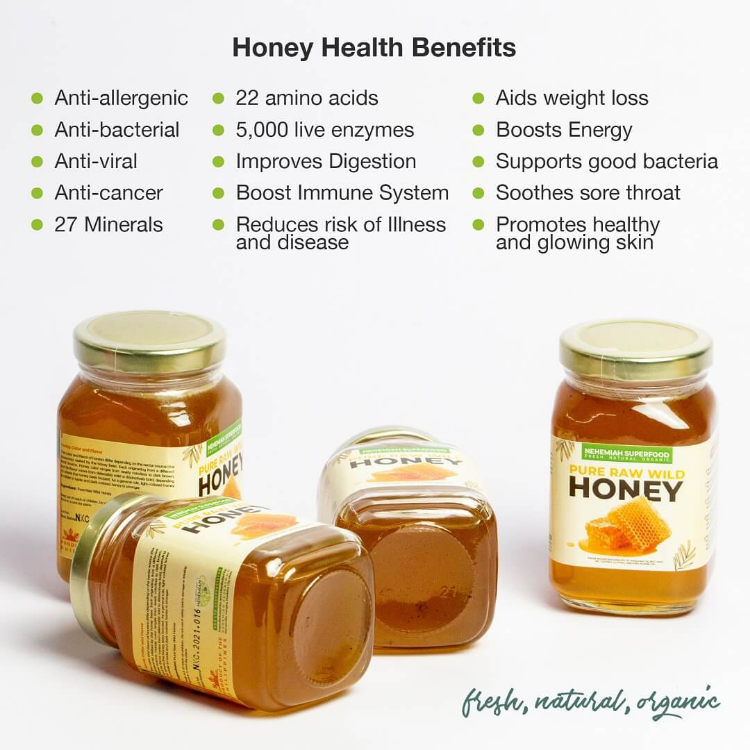- Introducing our Pure and Authentic Raw Wild Honey. A proud harvest of our local tribe in Mt. Guiting-guiting Sibuyan Island, Romblon and our local tribes in Mindoro. Raw honey has been used as a folk remedy throughout history and has a variety of health benefits and medical uses. It’s even used in some hospitals as a treatment for wounds. Many of these health benefits are specific to raw, or unpasteurized, honey. Most of the honey you find in grocery stores is pasteurized. The high heat kills unwanted yeast, can improve the color and texture, removes any crystallization, and extends the shelf life. Many of the beneficial nutrients are also destroyed in the process.
Here are some health benefits raw honey has to offer:
- A good source of antioxidants Raw honey contains an array of plant chemicals that act as antioxidants. Some types of honey have as many antioxidants as fruits and vegetables. Antioxidants help to protect your body from cell damage due to free radicals. Free radicals contribute to the aging process and may also contribute to the development of chronic diseases such as cancer and heart disease. Research shows that antioxidant compounds in honey called polyphenols may play a role in preventing heart disease.
- Antibacterial and anti-fungal properties Research has shown that raw honey can kill unwanted bacteria and fungus. It naturally contains hydrogen peroxide, an antiseptic. Its effectiveness as an antibacterial or anti-fungal varies depending on the honey, but it’s clearly more than a folk remedy for these kinds of infections.
- Heal wounds Honey is used in medical settings to treat wounds because it’s been found to be an effective germ killer and also aids in tissue regeneration. Studies show that honey can boost healing time and reduce infection.
- Phytonutrient powerhouse Phytonutrients are compounds found in plants that help protect the plant from harm. For example, some keep insects away or shield the plant from ultraviolet radiation. The phytonutrients in honey are responsible for its antioxidant properties, as well as its antibacterial and antifungal power. They’re also thought to be the reason raw honey has shown immune-boosting and anticancer benefits. Heavy processing destroys these valuable nutrients.
- Help for digestive issues Honey is sometimes used to treat digestive issues such as diarrhea, though there isn’t much research to show that it works. It’s proven to be effective as a treatment for Helicobacter pylori (H. pylori) bacteria, though, a common cause of stomach ulcers. It’s also a potent prebiotic, meaning it nourishes the good bacteria that live in the intestines, which are crucial not only for digestion but overall health.
- Soothe a sore throat Have a cold? Try a spoonful of honey. Honey is an old sore throat remedy. Add it to hot tea with lemon when a cold virus hits you. It also works as a cough suppressant. Research has suggested that honey is as effective as dextromethorphan, a common ingredient in over-the-counter cough medication. Just take one or two teaspoonfuls, straight.
- Promotes heart health According to research, the long-chain fatty acids and alcohols present in beeswax may lower blood cholesterol levels, a risk factor for cardiovascular disease. The antioxidants in honey may aid in widening the arteries that flow to your heart. Your risk of blood clots, heart attacks, and stroke may be decreased as a result of this potential increase in blood flow and decrease in blood pressure.
- Reduce coughing in children Upper respiratory tract infections, which can lead to coughing, are common in children. According to research, honey might be able to stop this cough. But because it includes spores of the C. botulinum bacteria, which can harm small newborns, honey or honeycomb shouldn't be given to kids less than 12 months.
- Brain benefits Honey's polyphenols may be able to reduce inflammation in the hippocampus, the memory-related region of the brain. The antioxidant and anti-inflammatory properties of honey are beneficial to the health of numerous bodily components, including the brain.
CAUTION: Dangerous for babies. Raw honey should never be given to an infant less than a year old.
INGREDIENTS: Pure and Raw Wild Honey.
REMINDER: Please do not refrigerate honey. Store honey in a cool dry place and always in a sealed container.
“All honey will crystallize over time,” agrees Bruce Shriver, the beekeeper at Gowanus Apiary. “Commercially processed honey tends to crystalize more slowly than raw honey. That’s because all of the particles (mostly pollen grains) have been filtered under high pressure and heat. This process not only removes the pollen but also destroys many of the naturally occurring yeasts, enzymes, flavonoids, polyphenols and microbial compounds.”
PLEASE BE INFORMED THAT THE TASTE OF THE ORGANIC, NATURAL, RAW WILD HONEY IS DIFFERENT FROM THE PROCESSED (PASTEURIZED) HONEY BECAUSE OF THE FOLLOWING:
"With nectar collected from so many different flowers and with native plants differing from region to region, it’s no wonder honey will taste different and color will vary. But that’s not the only thing that will impact your honey. The thickness of honey can change year to year with the weather." (https://www.naturenates.com/why-do-honeys-have-different-tastes/)
"The flavor of wild honey will change based on the location of the hive. Because it's made solely by wild bees and doesn't undergo intense processing, evidence of the insects' hard work could also be found in the honey." (https://www.foodrepublic.com/1480242/difference-between-wild-raw-honey/)








